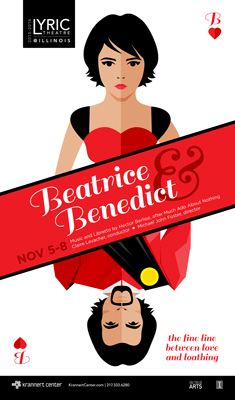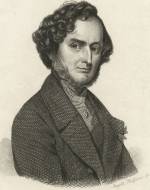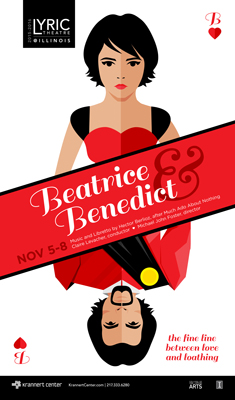Beatrice and Benedick are two of Shakespeare’s most engaging characters, with such enjoyable and intriguing dialogue that productions of Much Ado About Nothing can find A-list actors seeking to be cast in what is actually the subplot of the play. Threading in and out of the main storyline unfolding between Hero and Claudio, the fiercely independent couple trade jibes and barbs with delightful allusions and wordplay, until finally they allow themselves to be tricked into marrying each other. Over one hundred years ago, Berlioz recognized the true stars of this play, gave them the spotlight they deserved, and put them in an opera. This weekend, Lyric Theatre @ Illinois is giving music and theatre lovers the chance to experience Beatrice and Benedict, a work that finally puts it the right-way-round.
Rebecca asked guest-director Michael John Foster and Julie Gunn, Director of Lyric Theatre Studies, a few questions .
 Smile Politely: This year, it’s clear that the three main performances of Lyric Theatre@Illinois are all based on Shakespeare; is it common for your season to have a theme? What led you to choose Shakespeare in general, and these three shows in specific?
Smile Politely: This year, it’s clear that the three main performances of Lyric Theatre@Illinois are all based on Shakespeare; is it common for your season to have a theme? What led you to choose Shakespeare in general, and these three shows in specific?
Julie Gunn: We’re too new to be able to say that we have a theme to every season. Nonetheless, one of the pillars of Lyric Theatre is our commitment to the text. Most of the Lyric Theatre faculty comes from a musical background, and we are housed in the School of Music, but we are very aware of how interdisciplinary opera and musical theatre are—how music, text, design, and movement come together to make a whole. This academic year we mark the 400th anniversary of the death of William Shakespeare—the greatest writer and dramatist to use the English language. It seemed fitting that we celebrate his genius and immerse ourselves in his work. In the spring semester we’ll produce A Midsummer Night’s Dream and Kiss me, Kate ([an adaptation of] The Taming of the Shrew) as well.
SP: Beatrice & Benedict is a Romantic-era opera based on a Shakespearean play being staged today, which covers a lot of ground chronologically. What time-period will be reflected during this production — can we expect something very traditional, or more modern?
Michael John Foster: The original opera is what I call a cacophony of cultural influences. It’s a work based on an English poet about a story that takes place in Messina, Sicily and is performed in French. Combine that with the thought of American students speaking dialogue in English and well…..it becomes challenging to to tell a cohesive story. To alleviate some of the potential confusion, I proposed the idea that we set the story in New Orlean’s French Quarter in the early 1800’s. NOLA was at that time the most culturally diverse city on the continent with both French and English influences, not to mention Italian influences from a wave of immigrants via Brooklyn. It was also a naval port which could have been used to support the activity for the Barbary Wars providing an accurate backdrop for many of our characters who are returning from battle. And then there is the added bonus of the southern accent which lends itself so slyly to Shakespearean words such as “betwixt” and “fit the kidfox for a penny worth”.
SP: I see from Krannert’s website that this production will be sung in the original French, although there is an English translation from the 1990s. What reasons led to your choice to stick with the original, and how do you think this will contribute to the audience’s experience?
 MJF: It’s not uncommon in educational environments for productions to include sung portions in the original language while spoken dialogue is done in English. As a classical singer, you are required to sing in foreign languages so it is good for students to have that experience. Unfortunately, a student’s time is very limited and therefore learning great amounts of dialogue in another language can be near impossible. Additionally, Berlioz’s score is meant for French. A lot of color and nuance is lost if the French lyrics are replaced with English. Similarly, when Shakespeare’s words are usurped by a French translation, the humor and wit begin to evaporate. The music tends to be more serious in tone than the English dialogue which inspired it. The great thing about our production is that we work from the Dunn English libretto for our dialogue which contains a lot of Shakespeare’s original words and therefore re-infuses the show with a great amount of comedy.
MJF: It’s not uncommon in educational environments for productions to include sung portions in the original language while spoken dialogue is done in English. As a classical singer, you are required to sing in foreign languages so it is good for students to have that experience. Unfortunately, a student’s time is very limited and therefore learning great amounts of dialogue in another language can be near impossible. Additionally, Berlioz’s score is meant for French. A lot of color and nuance is lost if the French lyrics are replaced with English. Similarly, when Shakespeare’s words are usurped by a French translation, the humor and wit begin to evaporate. The music tends to be more serious in tone than the English dialogue which inspired it. The great thing about our production is that we work from the Dunn English libretto for our dialogue which contains a lot of Shakespeare’s original words and therefore re-infuses the show with a great amount of comedy.
SP: Along those lines…how do you feel an opera based on a play would translate to a theatric audience? Do you think someone who prefers attending plays would see the similarities, or is it a unique animal that requires an entirely different perspective?
MJF: I’m sure there are people who have their preferences between straight plays and musical works and there is nothing wrong with that. Specifically regarding Beatrice and Benedict, it’s important to note that it is its own animal. There are lots of aspects of Much Ado within the opera but it is its own entity in story, style and pacing. I think it is kind of difficult to truly compare the two. I honestly feel that it is better to compare the opera to something more like Sleepless in Seattle or Two Weeks Notice. It feels much more like a modern romantic comedy than Much Ado which has several dark turns.
SP: Have you had any particular favorite rehearsal moments, or experiences you’d like to share?
MJF: There have been several. My favorite moments in rehearsal are when the cast begins to laugh at the words they’ve just said or heard, because I then know they see the true meaning in the words. The words are no longer pretentious, as Shakespeare can be thought of, but rather they are real and have connection to the actor personally.
———
Lyric Theatre @ Illinois presents Beatrice and Benedict in Krannert Center’s Tryon Festival Theatre, from Thursday, November 5th through Saturday, November 7th at 7:30 p.m. with a 3 p.m. matinee on Sunday, November 8th. The show will run 2 hours and 20 minutes with a 20 minute intermission. Tickets begin at $29 with discounts for seniors, students, youth and University of Illinois students. Purchase tickets online or by calling the ticket office at 217-333-6280.
Image courtesy of Krannert Center for the Performing Arts.








